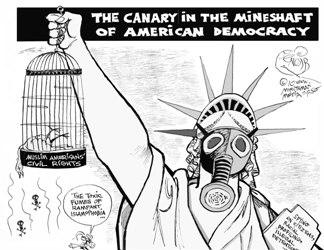Though our terrorists
Have mean intent;
Our biggest danger’s
From dissent.
Made it again. Onto and off of a plane, that is. Not everyone does. Immigration authorities held two members of my recent delegation to Haiti for hours. There was no clear reason for that and it caused them considerable airline and hotel expense from missed connections. Tough luck.
Liberals are always nervous in airports. You never know what kind of list you might have been put on, or what kind of flight you might be put off. If they could blacklist or hassle Cat Stevens, the late Ted Kennedy, and a decidedly unfamous 8-year-old kid like Mikey Hicks, who’s left?
 These days, many of the travel-challenged have Arab-sounding names, and there’s no shortage of spying on the rest of us either. Non-Arabs on the list are often protesters who take a dim view of some U.S. war or other. Governments don’t like citizens objecting to their wars. Wars are sacred. Who knows, they surmise, protesters may be disloyal or in league with the “enemy.” So authorities are inclined to wiretap or even infiltrate protest groups.
These days, many of the travel-challenged have Arab-sounding names, and there’s no shortage of spying on the rest of us either. Non-Arabs on the list are often protesters who take a dim view of some U.S. war or other. Governments don’t like citizens objecting to their wars. Wars are sacred. Who knows, they surmise, protesters may be disloyal or in league with the “enemy.” So authorities are inclined to wiretap or even infiltrate protest groups.
And so domestic spying comes to pass, even in the good old U.S. of A. Auditors are forever finding that the FBI has been stretching rules, tapping phones with no warrants, and listening to domestic conversations instead of limiting espionage to foreign ones. Apologies are rare, and withdrawal from unpublished suspect lists grudging.
Security behavior at civil protests is at least as bad. Veterans For Peace, my own enormously nonviolent organization, found itself infiltrated, raided, detained, robbed, and otherwise harassed prior to the last Republican National Convention. Who knows what conversations were intercepted? And who can imagine what humiliations the poor Muslim communities in the United States have to put up with by comparison?
No, counterterrorism agents probably aren’t paid on commission, but their careers, like most people’s, ride on what they produce. In that dark competitive world, the pressure to fudge the rules and to generate new suspects is enormous. Almost invariably, when you see an article about a pinched terrorist it turns out that he was entrapped by government informers. Was he ever a real threat without government help? It takes years of trial to find out, but you can bet that somebody got promoted in the meantime.
Unfortunately, this system has a steep downside. Ordinary Muslim citizens and their mosques have become leery of volunteering information to proper authorities. They can’t be sure if they or their colleagues are being set up. This has lowered the cooperation level that Muslim organizations had been trying to generate. It has also lowered our level of national security by compromising one good source of real tips.
The well is now poisoned for peace groups too. Provocateurs are assigned to tempt them into actions that would discredit them. Nor are many of the 400,000 souls on the “no-fly” list likely to be real terrorists. There are surely countless among them whom authorities just don’t like, whose name got spelled wrong, or who have the same name as someone else. There are also plenty whom bureaucrats just never get around to removing. Life is busy, you know.
Of course, you could do what Canadian businessman Mario Labbé did. He got off the list by changing his name (to François Mario Labbé).
Surely these infringements on personal freedom and privacy have always existed, but they reached a frenzy during George W. Bush’s presidency. I’d like to report that government behavior is much fairer now under Barack Obama. No such luck. It’s just a little less extreme.
Once domestic spying is installed, a classified bureaucracy emerges, driven by its own importance. Change is then hard and slow. Trust is lost. Society is diminished. That’s one reason a War on Terror soon breeds its own enemies. Yes, we still need a system to protect ourselves from wacko extremists, but by overreacting we are simply creating more of them.